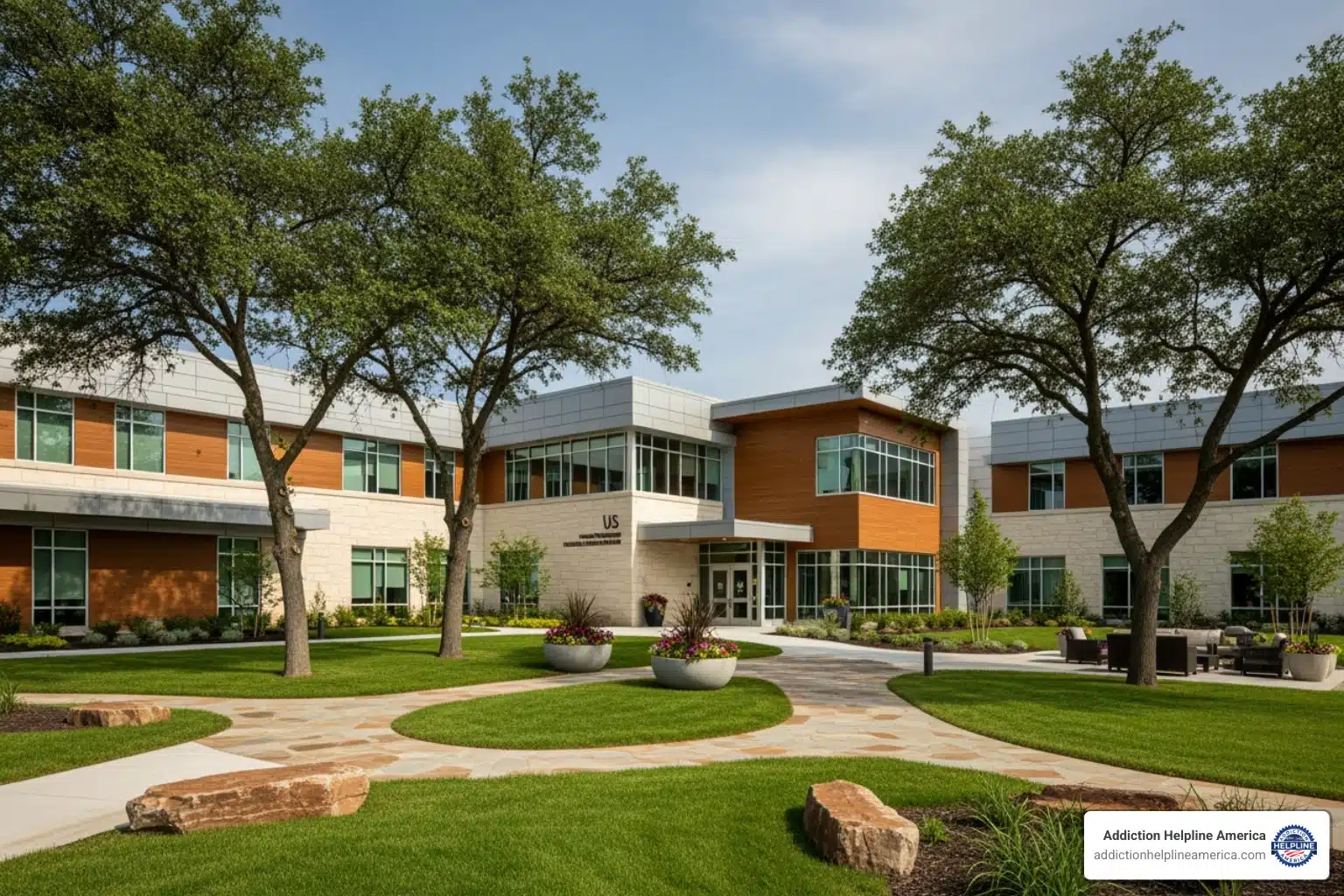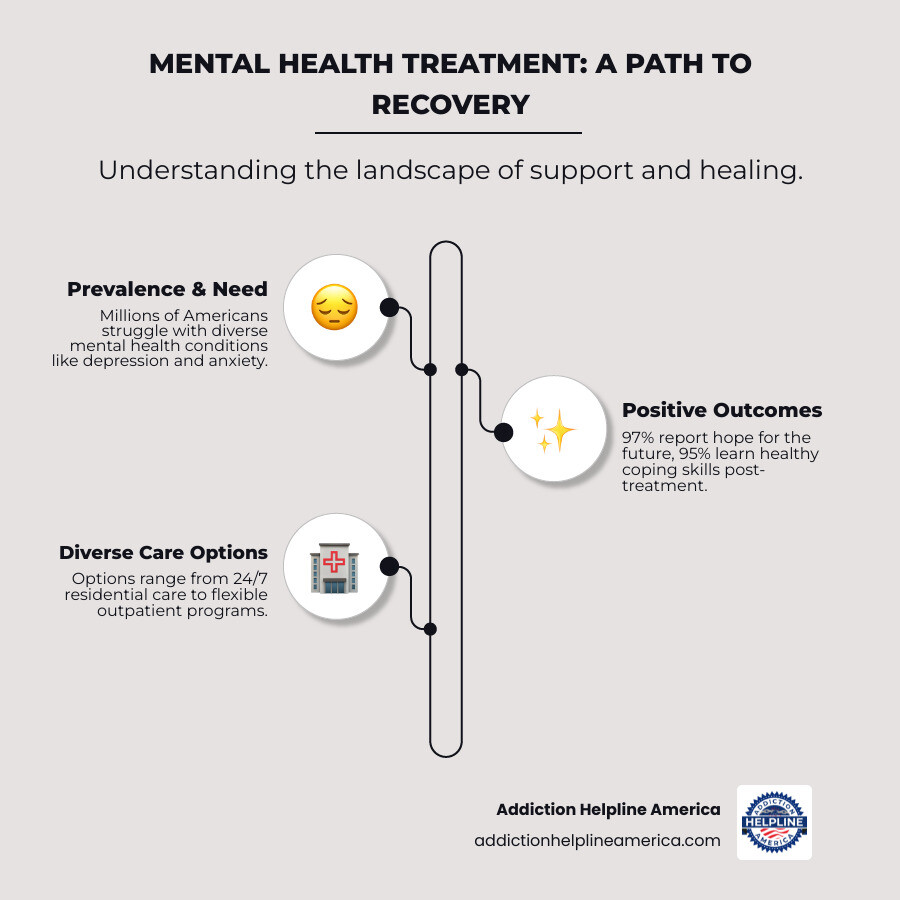
Your Path to Finding Health and Hope
Mental health treatment centers offer specialized care for millions of Americans struggling with depression, anxiety, trauma, and other mental health conditions. These facilities provide various levels of care – from intensive residential programs to flexible outpatient services – designed to help individuals develop coping skills, manage symptoms, and rebuild their lives.
Key types of mental health treatment centers include:
- Residential Treatment Centers (RTC) – 24/7 care in a therapeutic environment
- Partial Hospitalization Programs (PHP) – Intensive daily treatment while living at home
- Intensive Outpatient Programs (IOP) – Flexible therapy sessions around work/school
- Outpatient Centers – Regular therapy appointments and medication management
- Specialized Programs – Age-specific, trauma-focused, or condition-specific care
The path to recovery starts with finding the right fit for your unique situation and needs.
As Leonard shared in McLean Hospital’s ‘Deconstructing Stigma’ campaign, mental health treatment can be truly life-changing when you find the right support. Research shows that 97% of patients report feeling hopeful about their future after completing treatment programs, with 95% learning to control their symptoms using healthier coping skills.
At Addiction Helpline America, we understand the overwhelming challenge of choosing the right care when you or a loved one is struggling. Our team of experienced professionals has helped thousands of families steer mental health treatment centers across the country, connecting them with appropriate resources and support systems. We’re here to guide you through this critical decision with compassion and expertise.
Understanding the Landscape of Mental Health Treatment
Starting on a journey to wellness begins with understanding the terrain. This section provides an overview of the conditions treated at mental health treatment centers and the different levels of care available, helping you understand your options and find the path that’s right for you.
Common Conditions Treated
Mental health treatment centers are equipped to address a wide spectrum of psychological and emotional challenges, offering hope and healing for those who feel overwhelmed. While each center may have its own specializations, most treat a core set of conditions that affect millions of Americans every day.
Depression stands as one of the most common conditions treated at these facilities. Far beyond just feeling sad, depression is a serious mood disorder that causes persistent feelings of sadness, loss of interest, and decreased ability to function. Depression is a leading cause of disability worldwide, affecting over 300 million people globally. The good news? Treatment can significantly reduce symptoms and help individuals refind joy and purpose in their lives.
Anxiety disorders encompass a range of conditions characterized by excessive fear, worry, or nervousness. This includes Generalized Anxiety Disorder (GAD), Panic Disorder, Social Anxiety Disorder, and specific phobias. Many mental health treatment centers offer specialized programs designed specifically to help manage and overcome these challenging conditions that can make everyday activities feel overwhelming.
Obsessive-Compulsive Disorder (OCD) involves unwanted, intrusive thoughts (obsessions) and repetitive behaviors or mental acts (compulsions) performed to neutralize the obsessions. While OCD can be profoundly disruptive to daily life, specialized therapies like Exposure and Response Prevention (ERP) have proven highly effective in treatment settings.
Post-Traumatic Stress Disorder (PTSD) can develop after experiencing or witnessing a terrifying event. Symptoms may include flashbacks, nightmares, severe anxiety, and uncontrollable thoughts about the traumatic experience. Modern mental health treatment centers use trauma-informed care as a cornerstone of effective PTSD treatment, creating safe spaces for healing.
Bipolar disorder is characterized by dramatic shifts in mood, energy, and activity levels, cycling between periods of liftd mood (mania or hypomania) and periods of depression. Treatment focuses on mood stabilization and comprehensive symptom management to help individuals maintain stability in their daily lives.
Personality disorders involve patterns of thinking, feeling, and behaving that deviate significantly from cultural expectations, causing distress or impairment in relationships and functioning. Borderline Personality Disorder (BPD) is one common example, often treated effectively with Dialectical Behavior Therapy (DBT).
Schizophrenia and schizoaffective disorders are severe, chronic mental illnesses that affect how a person thinks, feels, and behaves. While these conditions present significant challenges, treatment focuses on symptom management, medication, and support systems to improve daily functioning and quality of life.
Co-occurring disorders, also known as dual diagnosis, are particularly common and complex. Research shows that about half of people with a substance use disorder also experience serious mental illness. Many mental health treatment centers specialize in addressing these interconnected conditions simultaneously, ensuring comprehensive care that treats the whole person rather than isolated symptoms.
Beyond these primary conditions, many centers also treat eating disorders, ADHD/ADD, emotion dysregulation, self-harm behaviors, suicidal ideation, and identity issues. Some facilities even offer specialized programs for unique populations, such as veterans dealing with military sexual trauma (MST) or moral injury.
Finding a center that specifically understands and treats your particular condition is crucial to successful recovery. The right match can make all the difference in your healing journey.
Levels of Care Explained
The world of mental health treatment offers a spectrum of care intensities, designed to meet people exactly where they are in their journey. Choosing the right level of care is one of the most important steps in ensuring effective and sustainable recovery.
Think of these levels like a ladder – you can step on at whatever rung feels right for your current needs, and you can move up or down as your situation changes. This flexibility is what makes modern mental health care so effective.
| Program Type | Intensity | Setting | Typical Duration | Key Features |
|---|---|---|---|---|
| Inpatient | Most Intense | Hospital/Residential | 5-14 Days | 24/7 supervision, crisis stabilization, medical oversight, highly structured environment |
| Residential Treatment (RTC) | High-Intense | Residential Facility | 30-90+ Days | 24/7 care in therapeutic setting, individual and group therapy, life skills training, holistic activities |
| Partial Hospitalization Programs (PHP) | High | Day Treatment Center | 3-6 Weeks, 5-7 Days/Week | Structured daily therapy, medication management, return home evenings |
| Intensive Outpatient Programs (IOP) | Moderate | Outpatient Clinic | 6-12 Weeks, 3-4 Days/Week | Flexible scheduling, group and individual therapy, maintain work/school |
| Standard Outpatient Care | Low-Moderate | Private Practice/Clinic | Ongoing, 1-2 Times/Week | Regular therapy sessions, medication management, maximum flexibility |
| Telehealth & Virtual Programs | Variable | Your Home | Flexible | Online therapy sessions, digital support groups, convenient access |
Inpatient care represents the most intensive level, typically reserved for individuals experiencing a mental health crisis or those who need immediate stabilization. These programs provide round-the-clock supervision in a hospital setting, focusing on safety and crisis intervention.
Residential Treatment Centers (RTC) offer a step down from inpatient care while still providing 24/7 support. These programs create a therapeutic community where individuals live on-site for extended periods, engaging in comprehensive treatment that includes individual therapy, group sessions, life skills training, and often holistic activities like art therapy or equine therapy.
Partial Hospitalization Programs (PHP) provide intensive daily treatment while allowing individuals to return home each evening. These programs typically run 4-6 hours per day, 5-7 days a week, offering structured therapy sessions, medication management, and skill-building activities. They’re perfect for people who need intensive support but have a stable living situation.
Intensive Outpatient Programs (IOP) offer the flexibility many people need to maintain their work, school, or family responsibilities while receiving treatment. These programs typically meet 3-4 times per week for several hours each session, focusing on group therapy, individual counseling, and practical skill development.
Standard outpatient care provides the most flexibility, with regular therapy appointments (usually once or twice a week) and medication management as needed. This level works well for people with strong support systems who can maintain stability between sessions.
Telehealth and virtual programs have become increasingly popular, offering convenient access to mental health care from the comfort of your own home. These programs can range from individual therapy sessions to online support groups, making treatment accessible regardless of location or transportation challenges.
The beauty of this system is that you don’t have to choose just one level forever. Many people start with more intensive care and gradually step down to less intensive options as they build skills and stability. Others might need to step up their level of care during particularly challenging times.
Your treatment team will work with you to determine the right level of care based on factors like the severity of your symptoms, your support system at home, any safety concerns, and your personal preferences and goals. There’s no shame in needing more intensive care – it’s simply about finding what works best for your unique situation and giving yourself the best chance at lasting recovery.
Our helpline is 100%
free & confidential
If you or someone you care about is struggling with drug or alcohol addiction, we can help you explore your recovery options. Don’t face this challenge alone—seek support from us.
Programs
Resources
Will my insurance
cover addiction
treatment?
We're ready to help
Find the best
drug or alcohol treatment
center
Are you or a loved one struggling with addiction? Call today to speak to a treatment expert.













